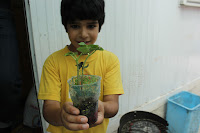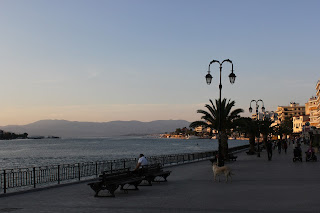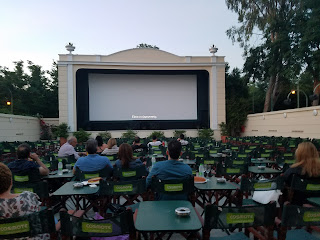The refugee crisis in Greece has changed—the approach to provide the right aid must change too.
Nine-year-old Omar* would only draw in black and white. He sat at a different picnic table than the other refugee children as they watched Leonie De Bruine, a volunteer from Holland, demonstrate how to draw a flower. He wasn’t disruptive or rude, but his quiet anger came through in the way he gripped his gray crayon. He drew a skull, silently defiant.
For a boy whose life has revolved around escaping death and fleeing war, this kind of drawing is to be expected. It reflects the frustration felt by many refugees—whose accommodations in Greece are becoming more permanent than they want to believe.
And for some outsiders, it solidifies the belief that volunteer art teachers’ efforts are a joke—they only undermine the refugees’ experiences. How dare they act like flowers and rainbows will “fix” the fact that 65,000 people are stranded?
To some extent, this criticism is based on reality. Two years ago, colored pencils would have done little to save refugees coming in on rafts from drowning. Today, however, the madness has subsided.
“We don’t need people here throwing clothes on people’s back keeping them warm and running around in emergencies,” says Emily Wilson, the educational coordinator of Project Elea, an organization that provides, among many other things, the art class Omar attends.
The healing power of art for expression
In a secondary aid scenario, such as the situation in Camp Eleonas, where Project Elea is based, people have their vital needs—food, water, and shelter—taken care of already. Survival mode switched off, the refugees face a new problem: post-traumatic stress paired with boredom, a potentially ugly mix.
This is when art can make a difference, even for adults. Referencing several murals depicted on the fence, Leonie describes the adult painting class in her Dutch accent:
“It’s very relaxed, we’re just like, ‘come out, smoke a cigarette, drink some water, have some tea. And in the meanwhile, we paint some wall.”
Painting gives the residents a reason to get out of their IsoBoxes—dumpster-sized air-conditioned shelters provided by the government—and engage with the other refugees.
“With the wall—there were seven people I never saw outside the house [who showed up]” says Leonie, “I never seen them before. Then they came out because one of the residents told them wall that painting is pretty fun. And they talked with each other.”
The resulting murals provided a conversation outlet for other residents as well. Several days after one wall was finished, Leonie witnessed a middle-aged man standing in front of the wall, tears streaming down his face.
“I asked him if he was okay. He said, ‘It just, it just looks like what I’ve been through.’ He was looking at black silhouettes of travelers, painted in crisp contrast to colorful clouds above.
Without the mural? “He never would have opened up to me.”
The challenge: lack of permanent volunteers
Not all volunteers are able to get through to refugees like Leonie is—and this is due, in part, to rapid volunteer turnover. In one year alone, there have been 600 different volunteers working under Wilson.
Wilson says she herself has difficulty remembering the names of the staff, and thus the residents likely have an even larger difficulty—imagine learning to trust someone after a week of opening up, only to watch him or her leave for Mykonos the next week, a brand-new Westerner in his or her place.
“It ends up doing more for [the volunteer] than the people we are trying to help,” she says, “[The refugees] have already lost pretty much everything and a lot of people. They don’t need to lose another person just for [the volunteer’s] own “voluntourism” ego-trip.”
Similar volunteer-based organizations have battled this very problem. Khora, an organization assisting families in squats, has a strict requirement: volunteers must sign a contract for a four-week minimum commitment.
Ramiar Farapour, the twenty-two year old who inducts Khora’s new volunteers, says the organization also aims to reduce the number of international volunteers:
“Our biggest challenge is getting in contact with the Greek community,” he says, pointing to the fact that involving locals provides a permanency that is desperately needed. Especially now that refugee children are being integrated into Greek schools, it is “of utmost importance” to have volunteers who can speak the language.
“We are also trying to get in touch with Greek students to come in the summer to work with us for two/three months,” he adds.
But Wilson points out one problem with this strategy—Greeks themselves are struggling to keep their finances afloat.
“Most people probably want a job before they start volunteering.” At least for Project Elea, international volunteers will continue to make up the majority of the team.
Further challenges include lack of space and resources. Project Elea is based solely on donations. “We don’t get any [governmental] funds from anyone,” she states.
A recent go-fund-me page, she hopes, will raise €8,000 to allow the program to build a new building on the camp—a recreation center of sorts.
“It’s necessary,” she says, “for the residents to feel normal again and to do things that people should be doing within any society.”
After all, this is a long-stay family camp. Whether they want to admit it, the refugees could remain in Greece for years.
Encouraging Refugees to Help Themselves
Though many of the refugees have been in Camp Eleonas for more than a year, few actually use the word “home”. Instead, many refer to the Isoboxes as their “containers.”
Says Wilson, “They don’t want to accept that they are living here. They see it as a limbo and any form of acceptance is a sign of permanency which they don’t want.”
One avenue to express this frustration is to resist taking care of the camp. When Project Elea volunteers spent a day cleaning up garbage and washing down the IsoBoxes, they quickly found them just as dirty the next week.
“They saw it as a temporary home, so they didn’t have respect or pride for it,” says Spanish volunteer Marta Rubio.
Then the twenty-six-year-old noticed Khalil Alfia, a little boy who had planted vegetable seeds in plastic cups. Inspired by the windowsill, she decided to change the program’s approach.
Project Elea launched the “Pimp My Street” initiative last week. Rather than cleaning for the refugees, the group decided to involve them.
Rubio and other volunteers created window-sill flower boxes using spare wood from pallets. The residents helped. Then, they let each family plant their own vegetables.
“If they help make decisions,” Rubio says, “then they will be more likely to help maintain it.”
What started as a planting project then turned into an entire street refurbishment. Using tarps to create shade, the neighborhood worked together to create a common area with picnic tables and a couch. Soon it became the most famous “street” in the camp.
Rubio hopes to continue the project in each of the other sections of camp, all while listening to the residents for their input.
As she adds detail to the makeshift mural—a painted bed sheet adhered to the barbed wire fence—she chuckles.
“I really didn’t want to add flowers. I think it looks weird. But the residents want it and this is about them.”
And the residents know it. Khalil Alfia’s father beams with pride as his son shows off the plant that started it all.
Noticing the camera, he says, “Take a picture. Take a picture of him.”
Families like his will continue to need volunteer aid—until, perhaps, they leave Camp Eleonas. But the campaign is a step towards freedom—in this one area of their life, the refugees can maintain complete control.
Omar breaks through.
Those who only volunteer for two weeks may conclude that art does nothing—Omar, for example, showed no signs of relieving his anger for several weeks.
But Leonie was invested for five months. Every day, she visited Omar in his family’s Isobox--to sit with him as he drew. Sometimes they talked, other times they sat in silence. But her consistent persistence created a routine that the family could safely anticipate—a refreshing change considering their journey to Greece was anything but routine. Leonie shared the moment she knew he had regained hope:
Omar’s normally-meek mother met her at the door with a hug and kisses. Startled, Leonie wondered what had happened. The uncharacteristic exuberance was quickly explained when the mother exclaimed,
“He finally draws with color!”
Sure enough, Omar had incorporated the other crayons in the box. A colorful city skyline stretched across the white canvas. And there were people in it—people who, Leonie adds, “looked alive and happy”. The drawing was a nod to Omar’s newfound hope—to leave this temporary home and settle down in Germany.



























































